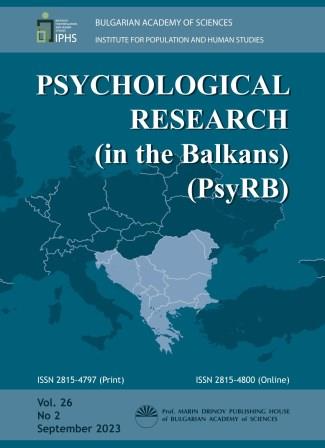SURVIVING A LIFE-THREATENING EVENT: THE FIRST COMPREHENSIVE FRAMEWORK EXPLAINING COPING WITH LIFE THREATS AS A WHOLE
SURVIVING A LIFE-THREATENING EVENT: THE FIRST COMPREHENSIVE FRAMEWORK EXPLAINING COPING WITH LIFE THREATS AS A WHOLE
Author(s): Tanya DimitrovaSubject(s): Social Sciences, Psychology, Sociology, Personality Psychology, Clinical psychology, Social Theory
Published by: Институт за изследване на населението и човека - Българска академия на науките
Keywords: life-threatening event; stressor appraisal; coping; depression; life satisfaction.
Summary/Abstract: This paper is the first to propose a comprehensive framework explaining the overall process of coping with life-threatening events. It encompasses: different types of such stressors (e.g. life-threatening illness/accident/assault, etc.), stressor appraisals (including challenge appraisal which is rarely considered in such studies), coping (using an instrument specially adapted for such context), as well as the interplay between these variables and its effect on mental health (measured through depression and life satisfaction). The community sample (N=153) completed: Coping Orientation of Problem Experience (COPE) with modified instruction (to recall a life-threatening event actually experienced), indicating also event`s nature and its appraisal; Severity Measure for Depression, Satisfaction with Life Scale, and socio-demographic survey. The data obtained suggested that the type of the life-threatening event is not related to differences in appraisal, coping, nor mental health outcome. It was also found that appraisals have a key role and special attention should be paid to challenge appraisal. The data suggested also that COPE with modified instruction is reliable instrument that captures the specifics of the life-threatening context. A four-factor structure was extracted: Problem-focused, Active emotional, Avoidant emotional copings, and Turning to religion, with the first and third factors being predictors of depression and life satisfaction, while second and fourth being related to depression or life satisfaction depending on the rest of the copings used. The framework proposed outlines the key elements in the process of coping with life threats and provides guidelines on how this data can be useful from theoretical and practical perspectives.
Journal: Psychological Research (in the Balkans)
- Issue Year: 26/2023
- Issue No: 2
- Page Range: 31-44
- Page Count: 14
- Language: English

